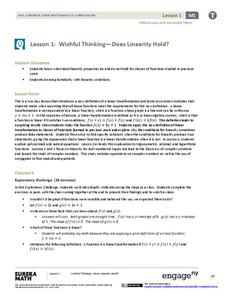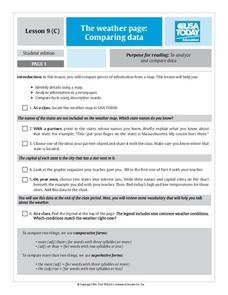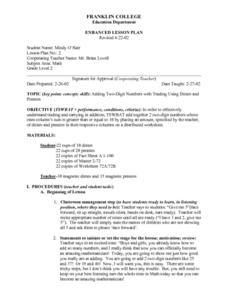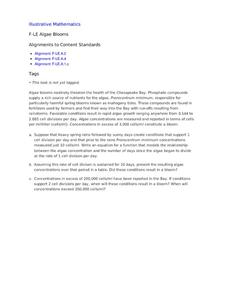Virginia Department of Education
Logic and Conditional Statements
If there is a conditional statement, then there is a hypothesis and conclusion. Pupils learn how to identify the parts of conditional statements. Class members continue to work with conditional statements and rewrite them in their many...
Curated OER
Conditional Statements
In this conditional statements review worksheet, pupils answer 5 multiple choice questions that involve identifying the conclusion, hypothesis, and the different types of conditional statements.
Curated OER
Conditional Statements
Young scholars are introduced to the topic of proofs in Geometry. During a PowerPoint presentation, they take notes on indirect proofs and have groups of students write a true statement. They are assessed on the statement and how well...
Curated OER
Multiplication Rule: Complements and Conditional Probability
In this probability worksheet, young scholars read story problems and set up complement and conditional probability problems according to the multiplication rule. Three story problems are included on this worksheet.
Virginia Department of Education
Inductive and Deductive Reasoning
Introduce pupils to the two types of reasoning, inductive and deductive. Classmates work in pairs or small groups to learn the difference between the two and apply these reasonings to develop valid conclusions.
Curated OER
Worksheet 6: Functions
In this math worksheet, young scholars answer 7 questions having to do with continuous functions, the Squeeze Theorem, and the Product Rule for differentiation.
Curated OER
Altitude to the Hypotenuse
Can your class solve right triangles and identify the properties common to right triangles? They will investigate and state the relationship between the altitude to the hypotenuse and the two segments of the hypotenuse formed by the...
Curated OER
Perpendicular Bisector Theorem
High schoolers construct perpendicular bisectors using Cabri Jr. on their graphing calculator. They then construct conditional statements about perpendicular bisectors along with their converse, inverse, and contrapositive.
EngageNY
Wishful Thinking—Does Linearity Hold? (Part 1)
Not all linear functions are linear transformations — show your class the difference. The first instructional activity in a unit on linear transformations and complex numbers that spans 32 segments introduces the concept of linear...
Curated OER
Worksheet 4 - Geometric Mean
In this geometric worksheet, students examine the geometric and algebraic definition of the dot product. They find angles between two curves, determine if two vectors are parallel, and explain conditions on vectors. This one-page...
Curated OER
Calendar Math
Pupils count and name the numbers and days on the calendar in order to determine the date. They identify the month and the entire date, and determine the pattern shown on the calendar markers. Students then calculate how many days they...
Curated OER
Multiplying by 10, by 100, and by 1,000
Fourth graders write tenths and hundredths in decimal and fraction notations. In this math lesson plan, learners know the fraction and decimal equivalents for halves and fourths. Everyone answers numerous questions posed by the teacher...
Federal Reserve Bank
Cash Flow and Balance Sheets
What is your car worth? How much do you owe? Individuals create their personal cash flow and balance sheets. They learn the difference between an asset and liability using their personal information to complete the activity.
EngageNY
The Side-Angle-Side (SAS) and Side-Side-Side (SSS) Criteria for Two Triangles to Be Similar
Playing with mathematics can invoke curiosity and excitement. As pupils construct triangles with given criteria, they determine the necessary requirements to support similarity. After determining the criteria, they practice...
Curated OER
Nested Similar Triangles
Nested triangles have been created so that they share a common vertex and vertex angle. Learners drag the endpoints of the side that is opposite the common angle to discover the conditions that make the nested triangles similar. When...
Curated OER
Solving a Simple Maze
It is a-maze-ing how lost one can get. Teams reconstruct a simple maze and solve it. Participants create an algorithm that a robot would follow in order to solve the maze as well. The activity includes an extension directing pupils to...
Curated OER
The Seed Connection
Second graders investigate the best conditions for growing plants while considering how math, science, and technology are interrelated in this study. They partner with an upper grade through the use of the Internet and conduct a...
Curated OER
Geometry, Measurement & Reasoning
Students construct two-column proofs. In this geometry lesson, students use deductive reasoning and geometric properties to justify given geometric statements. Students compare and contrast proofs.
Curated OER
What is a P-value?
Students test the hypotheses using p values. In this statistics activity, students define and examine conditional probability. They test each statement for a true statement or a false statement, based on the sample size.
Curated OER
The Weather Page: Comparing Data
Students analyze data from maps. In this comparing data activity, students use comparative and superlative statements to draw comparisons among the weather in different American cities based on USA Today weather maps.
Curated OER
Adding Two Digit Numbers with Using Dimes and Pennies
Second graders participate in a math game using dimes and pennies. They practice combining coins to make a given amount of money, and they use the combinations to practice adding two digit numbers. Teacher assessment strategies and...
Curated OER
Making Circle Graphs
Seventh graders engage in the practice of a Math instructional activity. Students practice the use of circle graphs in class and on homework as an extension. The instructional activity includes a classroom management portion. The...
Curated OER
Applications and Problem Solving with Inequalities
In this problem solving worksheet students read short statements and translate them into algebraic inequalities. They read short stories, write algebraic equations, and solve them. There are 16 problems on this two-page worksheet.
Curated OER
Algae Blooms
Your microbiologists explore a changing algae population and build an exponential function modeling algae concentration from the description given of the relationship between concentrations in cells/ml and days of rapid growth.























